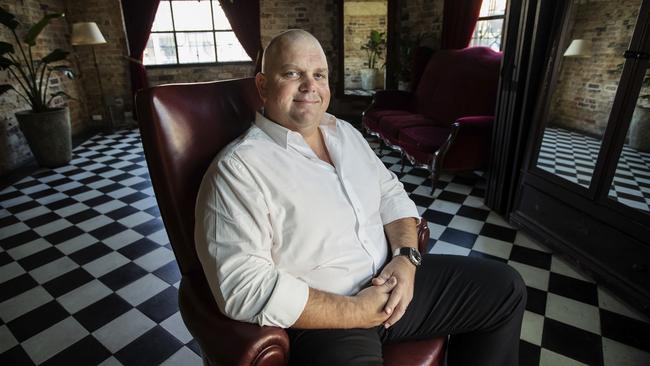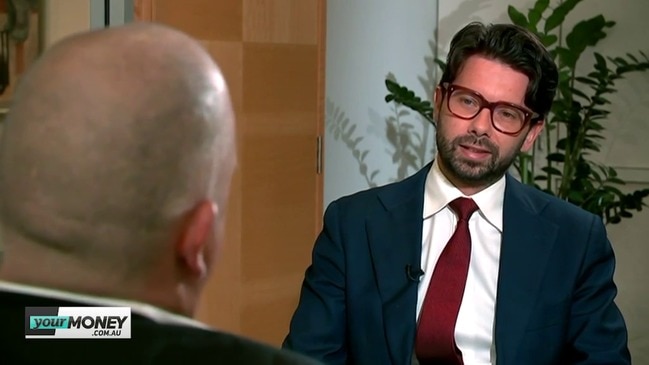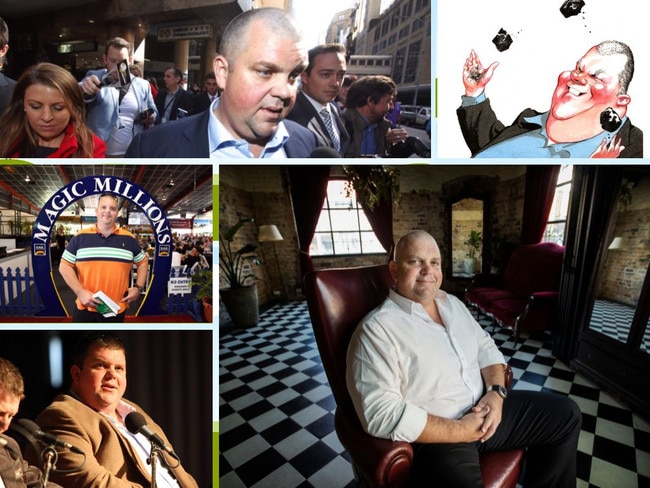Nathan Tinkler and Whitehaven Coal trial kicks off, after former coal baron alleges ‘shareholder oppression’
Years after the case was first launched, former mining baron Nathan Tinkler has broken his silence with an exclusive interview in The Australian. READ THE LATEST IN THE COURT CASE.

Former coal baron Nathan Tinkler’s bid to have ASX-listed giant Whitehaven pay up what he claims is millions of dollars worth of missing shares has kicked off, after he broke his silence about the court fight days ago.
Years in the making, Tinkler — whose stunning career turned him from one of Australia’s youngest billionaires to bankrupt — launched into the first day of a trial in his NSW Supreme Court class action on Tuesday.
Brisbane based Tinkler has alleged Whitehaven is responsible for failing to develop any of Boardwalk’s four coal projects it picked up when the two companies merged in 2012, denying its shareholders milestone payments.
Whitehaven initially proposed Boardwalk’s shareholders inject $150m as a feature of the takeover and that milestone shares would be unlocked when the projects secured environmental approval, the court heard on Tuesday.
“In exchange Whitehaven proposed the issue of 85 million unrestricted shares,” Tony Bannon SC, barrister for Les & Zelda Family Trust — a company linked with Tinkler, said.
Mr Bannon said milestone shares would be issued to ensure shareholders get rewards for injecting money into Boardwalk’s projects that Whitehaven took on.
But he said after the deal went through, Whitehaven impaired the projects and “ceased exploratory work” on them.
Speaking to The Australian last week, Tinkler said deal sank when Whitehaven failed to develop any of Boardwalk’s four mining projects in NSW and Queensland, denying milestone payments to Boardwalk shareholders.
“What we’re aiming for is for the shares to become unrestricted, and be treated like every other Whitehaven shareholder,” Mr Tinkler told The Australian.
A Whitehaven spokesman previously said the company “strongly denies the allegations and will vigorously defend the proceedings”.
The story so far
Boardwalk was an unlisted coal exploration and development company that had interests in the NSW-based Ferndale and Queensland-based Dingo, Sienna and Monto projects.
In about 2011, Whitehaven was in negotiations to merge with Aston and subsequently approached Boardwalk. According to Tinkler’s pleadings, Boardwalk raised $150m for a planned initial public offering but abandoned it after the possibility of a Whitehaven deal.
Tinkler’s amended statement of claim alleged 445 megatonnes of coal was identified out of the Ferndale project with about $8m spent on initial exploration. Further, it claimed Aston and Boardwalk already spent $4m on the Dingo project.

It is unclear how much may have been spent on the Sienna and Monto projects, but Tinkler’s court documents say they were all eligible for mining leases.
Tinkler agreed to inject $150m as part of the merger so Whitehaven could develop the projects, and repay an existing debt of $US50m and deferred payments of $15m.
As well, Whitehaven issued close to 120 million shares to Boardwalk shareholders as part of the deal, which fell into two groups.
It included 85.88 million Whitehaven shares that were unrestricted – meaning they could be sold immediately and shareholders could receive dividends — plus 34.02 million shares that would be subject to restrictions and lifted if mining leases and environmental approvals were secured for some or all four projects, according to Tinkler’s case.
“We put our money in to support our assets, which at the time (in 2012) there was concern from ASIC and a number of shareholders of Whitehaven and Aston that I was getting a collateral benefit or advantage by selling Boardwalk,” he told The Australian.
“I put money in to support the development of those assets. Unfortunately, Whitehaven chose to write down the value of those assets in record time.
“Whitehaven has not done any work on them to advance them towards mining leases or to add value for all shareholders.
“And here we are, 12 years on, and these assets aren’t even in Whitehaven’s 20-year plan.”
Tinkler told The Australian the matter is a “pretty clear case of shareholder oppression” and he is confident he can win.
He said he hoped Whitehaven was not engaging in “payback” when it failed to develop the mining projects, after he walked away from a $5.2bn bid to take Whitehaven private in August 2012.

Tinkler was first motivated to launch the class action after Whitehaven acquired Queensland’s Winchester South coal project in 2018, he said. “They’ve got $500m in that asset. It’s a poor quality asset,” he said.
Tinkler has alleged Whitehaven breached the terms of its implied deal with Boardwalk and is seeking damages and a commitment it will vest the restricted shares.
Whitehaven’s defence
In Whitehaven’s defence papers, the coal giant agreed the shares would be released after “trigger events” but said there was “no time limit” specified in the deed that stated when the shares needed to be vested by.
“(Whitehaven) says that the ‘trigger events’ in clause 3.2 of the restriction deed have not occurred and therefore no ‘vesting’ under clause 3.3 of the restriction deed has taken place,” the company’s defence paper says.
Whitehaven went beyond claiming there was no time limit on when the shares must be vested; it also alleged that in two investor presentations about the merger in late 2011 and early 2012, identical notes were included about the exploration of each of the four mining projects.
“The potential quantity and quality of the exploration target is conceptual in nature, there has been insufficient exploration to define resources, and it is uncertain if further exploration will result in the determination of resources,” the defence paper says.
Whitehaven’s defence alleged the Boardwalk projects simply provided it with “future development options” and a “platform for growth in the medium to longer term”, but “no assurance those projects would be developed”. It went further to make it known there were “key risks to the Boardwalk projects” that included there being no “guarantee that future exploration on Boardwalk’s existing tenements would lead to economically viable resourced [sic] being identified and developed”.
As well, it said: “there may be delays in obtaining or the inability to obtain relevant authorisations and permits (including mining leases) which could adversely impact on the viability of new projects or their cost and development time frames”.
Who is Tinkler?
Tinkler has had an extraordinary career. He shot from electrician to resources millionaire in the space of a few years after paying $1m for the Middlemount coalmine in central Queensland in 2006.
In 2008, he sold his stake in the mine and at age 32 he became Australia’s richest person under 40 with a fortune of $442m. After the 2012 deal went through with Aston Resources and Whitehaven Coal, he had a net worth of more than $1.1bn and was crowned the nation’s youngest billionaire.
He invested in the Patinack horse racing farm on the Gold Coast hinterland and injected cash into the NSW-based Newcastle Jets and Newcastle Knights in the years after his windfall.
But as coal prices tanked so did his business empire which collapsed in 2016, owing $540m.
He was declared bankrupt but had the decision annulled in 2018 and in 2021 a ban on managing corporations was lifted.
Asked if he was considering a tilt at entering the resources industry again, Tinkler said no.
“All I’m really focused on is getting back a little bit of the value that I built in Whitehaven that was written off,” he said. “I’ve really enjoyed the last few years, being out of all that. Public life is not a high priority for me. Resolving this and raising my family, that’s my priority.”




